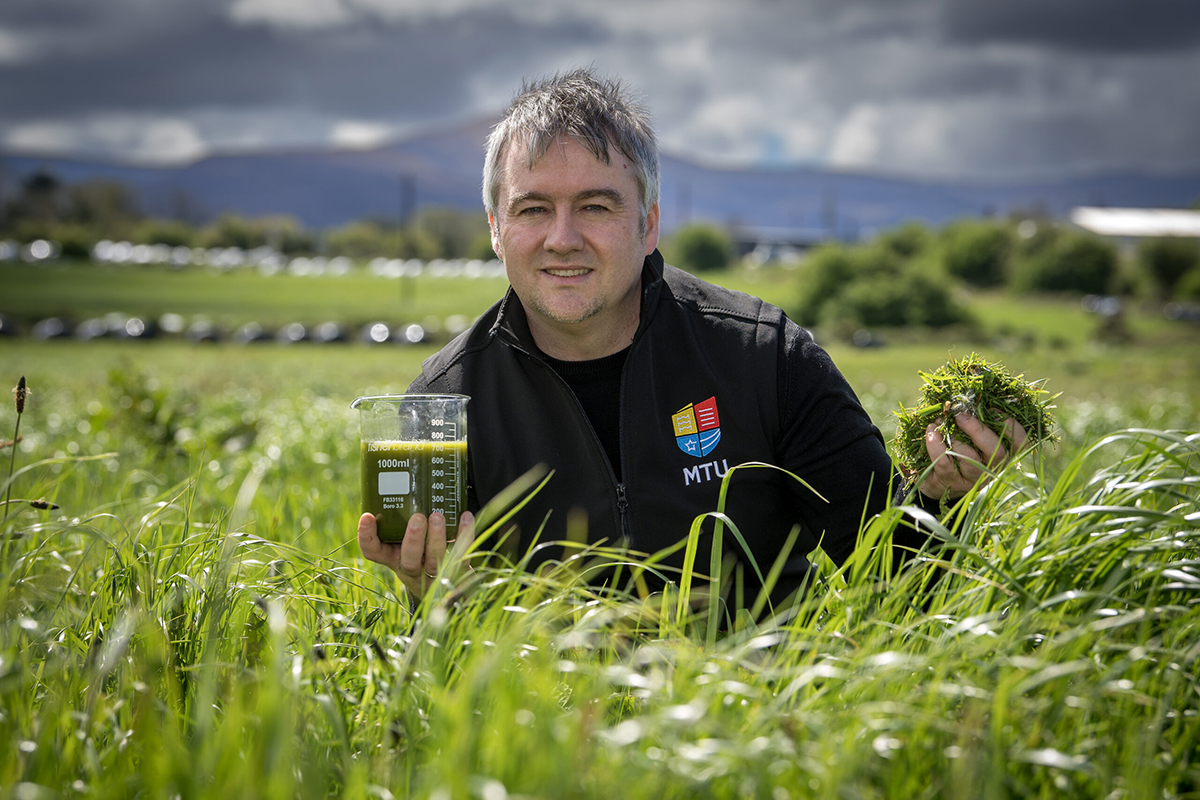Munster Technological University will lead a new first-of-its-kind decentralised green biorefinery demonstration initiative funded under the Circular Bio-based Europe Joint Undertaking (CBE JU). The €8.7 million “Rural BioReFarmeries” project will advance the development of farm-centred bioeconomy approaches through the deployment of green biorefineries across grassland regions of Europe.
Two primary green biorefinery and anaerobic digestion demonstration sites in Ireland and Denmark will optimise the conversion of grasses, clover and green biomass residues sourced from local farms into value-added products such as human and animal grade protein, bio-based food packaging, flavours, anti-microbials, fertiliser and energy, in collaboration with upstream research and industrial sites in Netherlands, Ireland, Denmark and Poland.
Speaking about the new initiative, Project Coordinator James Gaffey, Co-director, CircBio, MTU, said: “Grassland valorisation and emerging grass-based value chains represent a major strategic opportunity for the EU bioeconomy. By improving the efficiency and circularity of our vast European grasslands, we can produce, not only forage, but also food, high value materials and energy. Green biorefineries are a key enabling technology which can help rural grassland farmers to address challenges such as income diversification, accessing sustainable inputs for their farms, displacing unsustainable products and contributing to our climate and sustainability targets. Rural BioReFarmeries builds on the latest research of various EU countries to optimise green biorefineries by overcoming existing limitations and implementing these business models on the ground with farmers, cooperatives and other industries across multiple sectors”.
Rural BioReFarmeries will test a decentralized approach, in which the biorefining activity begins in the farm, combining the smart production and harvesting of sustainable local biomass with decentralized processing close to the farm, and the subsequent transfer centrally of biorefinery co-products to relevant downstream sites for further product development.
According to Morten Ambye-Jensen, Head of CBIO Centre at Aarhus University: “To catch the environmental benefits and potential of new green biorefineries, we need to make it a commercial success and implement it at scale. The commercial implementation of green biorefineries is challenged with difficult and expensive logistics as well as limited product revenues. In Rural BioReFarmeries we will develop smart biomass supply chains combining decentral and central processing, lowering total logistic costs while carefully assessing consequences and potentials for product yields and quality. On the product side we will increase the revenue by establishing new cascading value chains including simultaneous production of both human and animal grade protein, flavours, biomaterials, fertilisers, and energy. All this demonstrated in close to commercial scale. We therefore have great expectations to the impact of this new large CBE JU project.”
The project will work intensively with primary producer partners on the ground, including within the dairy and pig sectors, while also linking these farms to upstream industries (e.g., food and flavour, animal nutrition, packaging, microalgae, fertilisers) creating new value chains and replicable business models and training activities which will be transferred across rural regions of Europe.
Enda Buckley, Director of Sustainability at Carbery Group welcomed the development saying: “We are delighted to be part of this initiative through our flagship project Farm Zero C – which is creating a model for climate neutral dairy farming. Both initiatives are seeking to create sustainable futures for Irish and European farmers, using scientific advances. A key focus of the Rural BioReFarmeries project is providing farmers with a circular bioeconomy business model that also helps to address many of the sustainability challenges which they face. In this sense, the project addresses many issues such as feedstock sustainability, sustainable protein alternatives, displacement of fossil-based products, and circular use of process residues”.
Kevin O’Connor, Director of BiOrbic Centre at University College Dublin stated: “Farms and farmers are central to the Bioeconomy. Biorefining on farms will be a critical part of the circular bioeconomy operational systems where both food and non-food products will be produced. On-farm biorefining will help the integration of farmers into new value chains allowing them to diversify their business and promote greater wealth creation for them. Rural BioReFameries is the co-operation of researchers and stakeholders in the value chain to help bring this vision closer to reality”.
Rural BioReFarmeries brings together 19 partners from 8 countries including Munster Technological University, Aarhus University, Carbery Group, University College Dublin, Kilpatrick Innovation (Trading as NuaFund), Carbon Harvesters, Barryroe Cooperative, Farm B, Wageningen University, Carhue Piggeries, SEGES Innovation, PaperFoam BV, Alganed BV, Poznan University of Technology, Agricultural University of Plovdiv, Sapienza University of Rome, MTU Australo Alpha Lab, University of Galway and Trinity College Dublin.
Further information on the project can be found here: https://www.mtu.ie/news/mtu-green-biorefinery-demonstration-initiative/







